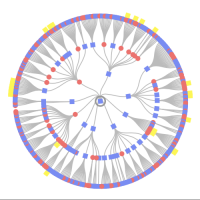New Search Tips and Tricks

I've been experimenting to find ways to get the new engine to return better results, and now I can understand why the hint keeps popping up saying "sometimes less is more"
Example: The events of interest occur in Bethnal Green, which was in Middlesex, but is now absorbed into the metropolis known as London which itself has had district boundary changes over time. In many records, the Town and County are reversed i.e Middlesex, Bethnal Green, in more they are abbreviated, Middx. or B.G. The standarised place name also varies significantly as the matching algorithm evaluates a probable match.
How to find the records of interest ? - No problem, here are thousands of results, sift through them. - Not ideal.
Using 'Exact' ? - Nope, that only returns the exact match. Not all of the records of interest contain that exact whole phrase.
Solution - Wildcards as well as Exact ! This is what less is more means. Find the most unique few letters that are likely to be in the name, and then bracket those letters with asterisks.
In the above example, putting asteriskBethasterisk (tish! it won't let me use a real asterisk ) in the search field and then turning on exact will pull up results that contain Beth, which includes Bethlehem, but that's less liklely to have the surname were seeking. Simlarly, using asteriskHolboasterisk will work for all the variations of place names containing Holbo, regardless of whether it's Holborn, London London, Holborn Middx. Holborn etc.
It's taken a while, but I can now get 'some' work done.
Comments
-
Now this is helpful - see you don't even have to be from FamilySearch to teach something to the FamilySearch community!
Here's an asterisk - *
RegEx reference to play around with: https://help.relativity.com/10.3/Content/Relativity/Regular_expressions/Searching_with_regular_expressions.htm
1 -
It's going to be hard work trying to explain about REGEX wildcards to novices, but as a start, a ? is any single letter and a * is any number of letters or none.
So for instance: There is a surname Gittins, which is often represented as Gettins, or Gittings.
To find all variants (plus some others), enter G?ttin* in the surname field and select 'exact'
You will get a lot of Gottingen and Gatting etc, but you won't miss Gettins, Gittins, Gettings and Gittings.
2 -
(@genthusiast, the problem on this forum isn't with typing a single asterisk, but with getting it not to interpret a pair of them as italics on the text between. @LDS Search Test, the trick is to type it up in a text editor, and then just paste it here, already complete: *asterisks*. I had to include the period in the copy-pasted text, because typing anything immediately adjacent to the punctuation triggers the parser.)
2 -
@Julia Szent-Györgyi Duly noted, thanks. The first time I entered the search criterion with asterisks in the posting, it was converted into italics. If I enter a single asterisk it's fine, thereafter I can cut and paste it where I want it.
1 -
I am still waiting for Booleans in the names search fields. I long to be able to search for, say, Maria NOT Anna.
0 -
"Input cannot contain the following characters: < > ~ ` + = % # ^ : & | ( ) { } [ ] \"
I notice that the exclamation mark is not prohibited, does this mean that NOT is allowed ? More experimentation needed.
Update: It seems to be ignored.
Also the surname matcher seems to ignore spaces in a surname when comparing an exact match. So the exact criterion *??winkelr??d* will find Pearl Marie Krahwinkel Rand, and Dena Rexwinkel Reiderman, when it shouldn't.
1 -
"Input cannot contain the following characters: < > ~ ` + = % # ^ : & | ( ) { } [ ] \" Because this would leave the site wide open to database injection attacks. Filtering out those characters allows the user to form some kind of query that can be used in database selection without having to work too hard to keep a malicious hacker from damaging the database.
0

